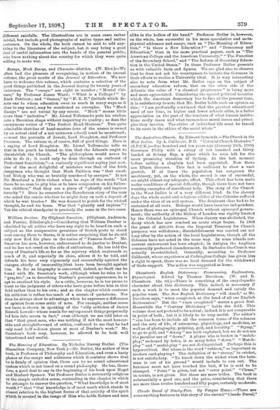Essays, Mock Essays, and Character - Sketches. (W. Rice.) — We often had the
pleasure of recognising, in notices of its annual volume, the great merits of the Journal of Education. We now have to welcome this volume, which contains a selection of the good things published in the Journal during its twenty years of existence. The "essays" are eight in number; "Mental Cul- ture," by Professor James Ward ; "What is a College ? " by Mark Pattison ; and "Games," by "B. E. B." (initials which de- note one to whom education owes as much in many ways as it does to any man), may be mentioned as examples. The "Mock Essays" are not trivial by any means. "Mock" means little more than "imitative." Mr. Lionel Tollemache puts his wisdom into a Baconian shape without impairing its quality ; so does the anonymous writer of "The Perfect Head-Mistress." Two quite admirable sketches of head-masters (one of the names is owned by an actual chief of a not unknown school) must be mentioned ; so must the portraits of Jewett, Lord Houghton, and Professor Freeman. The volume is, of course, full of good things. Here is a saying of Lord Houghton. Mr. Lionel Tollemache tells us that in his youth he hinted to him that the Liberals ought to disestablish the Church. "The philosophers would never be able to do it ; it could only be done through an outburst of Protestant fanaticism,"—a curiously significant saying just now. One of the most delightful of mistakes was that of the Irish clergyman who thought that Mark Pattison was "that excel- lent Bishop who was so brutally murdered by savages." Is not Mr. Morehead a little violent when he says of the words "Let there be no man to pity him or to have compassion on his father- less children," that they are a piece of "ghastly and impious ferocity " ? Does he remember the Herodotean story of the man who asked the oracle whether he might deny on oath a deposit of which he was trustee P He was doomed to perish for the wicked thought, he and his house. Was that "ghastly and impious " ? Yet the ethical standpoint is precisely the same in the two cases.


































 Previous page
Previous page